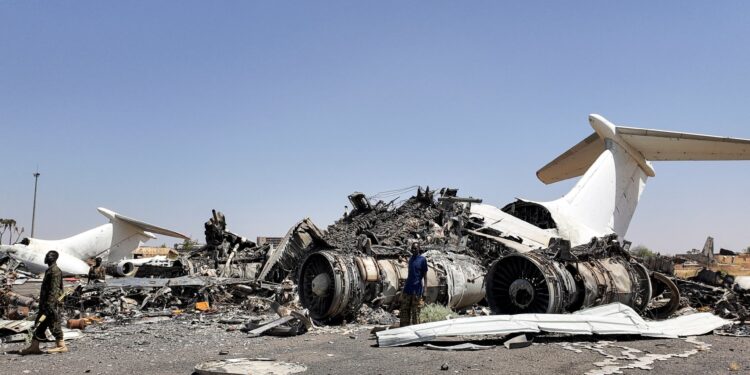Al -Jazeera Net Correspondents
The war in Sudan, today, April 15, 2025, enters its third year, amid a continuous decrease in the areas of the Rapid Support Forces control, and a rapid advance to the Sudanese army, which imposed a direct question about who will pay the bill for the reconstruction of Sudan, in light of the availability of many indicators indicating the end of the war.
The war led to a widespread collapse of the country’s infrastructure; Where the Sudanese Minister of Finance, Gabriel Ibrahim, revealed in a previous interview with “Al -Jazeera Net” that the losses in infrastructure, public facilities, factories, companies and public and private property may be estimated at billions of dollars.
The economist, Dr. Adel Abdel Aziz, said in an interview with “Al -Jazeera Net” that the war affected all economic sectors in a different way, as preliminary estimates indicate that the losses of the Sudanese economy in various sectors range between 127 and 140 billion dollars.
Government optimism
Sudanese officials expressed their optimism that several international parties can participate in the reconstruction and the return of investments to the country. On March 29, the President of the Sudanese Sovereignty Council, Abdel Fattah Al -Burhan, stated that the reconstruction of the state and its infrastructure still requires additional efforts.
For his part, the Minister of Energy and Oil, Mohieldin Naim, confirmed in statements to “Al -Jazeera Net”, that during his visits to China and India, he touched a serious desire to work again with Sudan in the oil sector.
He pointed out that the ministry has a plan for the reconstruction and rehabilitation of the war in the fields of oil and electricity, expressing its optimism about Sudan’s return to its natural position in production.
As for the Sudanese Foreign Minister Ali Youssef Al -Sharif, he explained that there is a lot of work required in relation to basic needs such as electricity, water, health services and schools, to re -develop Sudan.
He said in an interview with “Anatolia” agency, that they are cooperating with Türkiye, Saudi Arabia, Egypt, Qatar and Kuwait in these areas.
Al -Sharif noted that Türkiye will be among the most supportive countries for Sudan in the reconstruction phase, noting that there is a perception of bilateral and multilateral cooperation that includes joint initiatives with Qatar and Saudi Arabia to accelerate these efforts.
He also called on the United States and European countries to play a role in reconstruction, pointing out that the government is seeking to hold international conferences to win the support of countries that wish to return Sudan to its normal position.
Mobilization
Economist Adel Abdel Aziz believes that there are several possible sources to finance the cost of reconstruction, including:
- Internal sources are to mobilize national resources.
- The Sudanese businessmen residing abroad, who have financial capabilities and investments in a number of countries, as well as attracting Sudanese immigrants who have financial surpluses, attracted to invest these surpluses in Sudan through public joint stock companies that are managed according to the highest quality and transparency standards, with the aim of contributing to reconstruction efforts.
- Projects for international organizations that can contribute to reconstruction within official financial aid programs.
- The bank and the International Monetary Fund, despite their association with political issues that may hinder support in the current circumstances.
- Institutions belonging to countries such as China, Russia, India, Turkey, Iran and South Africa, in addition to countries within the framework of the “BRICS” system, can provide development aid for reconstruction, if the Sudanese government works to achieve common interests with it.
No one will pay
The former Commissioner -General for Humanitarian Aid in Sudan, Dr. Salah Al -Mubarak, drew a dark picture of the future of reconstruction after the war, describing the destruction that Sudan was comprehensive and unprecedented in the world.
He said in an interview with “Al -Jazeera Net”: “No one will pay the bill of reconstruction,” explaining that the size of this bill is very large, and it seems that the Sudanese citizen who paid the price of the war will be forced to pay the price of reconstruction as well.
On the possibility of the contribution of humanitarian organizations and the international community to relief and reconstruction efforts, Al -Mubarak, who was responsible for managing human affairs and the work of organizations in the first year of the war, said that organizations are completely powerless.
He pointed out that the aid that arrived in Sudan until now, and before reaching the stage of reconstruction, was very small, although the Sudanese person lost everything, and it became at the worst stages of the emergency without food, water, medicine or education, and he did not find someone to stand by his side as happened in other countries.
Organizations are unable to reconstruct
As the Sudanese army’s victories in Khartoum accelerate, in exchange for the successive defeats of the Rapid Support Forces, many Sudanese circles began talking about the bodies that could contribute to the reconstruction of what was destroyed by the war, in light of complex internal, regional and international conditions, amid cautious optimism that international organizations can play a role in the efforts of reconstruction and recovery.
Al -Mubarak explained that the previous experiences of countries came out of wars showing a shortage of international seriousness on reconstruction, adding that reconstruction conferences require “international cranes” and strong global sympathy that pushes others to contribute, which he said is currently missing in light of the imposed isolation, and the standing of some countries alongside those who committed crimes in Sudan, as he put it.


